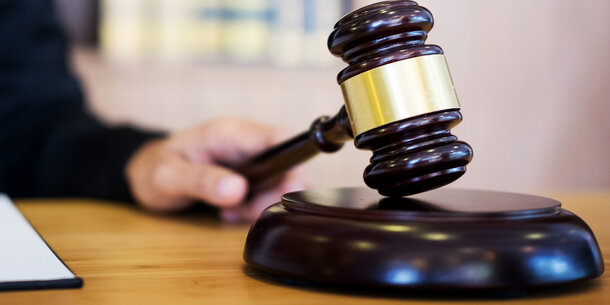Former Massachusetts Judges Oppose ICE Courthouse Arrests
On May 21, the Brennan Center filed an amicus brief in the First Circuit Court of Appeals on behalf of 19 former Massachusetts judges and justices opposing U.S. Immigration and Customs Enforcement’s (ICE) policy of making arrests in and around courthouses in the state.
The amicus brief, filed in support of the plaintiffs in Ryan v. ICE, urges the First Circuit to affirm a preliminary injunction issued by a federal district court prohibiting ICE from “civilly arresting parties, witnesses, and others attending Massachusetts courthouses on official business while they are going to, attending, or leaving the courthouse.”
In their brief, amici detail the harm courthouse immigration arrests do to the Massachusetts justice system, arguing such arrests limit access to justice, interfere with the judiciary’s ability to conduct court business efficiently, and damage the public’s trust in the courts.
Existing Barriers to the Civil Justice System Worsened by Covid-19
Access to the civil justice system for self-represented litigants has worsened as a result of the Covid-19 pandemic, according to Buzzfeed News.
With courthouses closed or operating on a more limited basis, civil courts are struggling to meet the needs of self-represented litigants. The move to remote operations has also assumed that litigants will be able to navigate cases on their own, or have access to the technology required for virtual proceedings, further exacerbating an already strained civil justice gap.
Unlike the criminal justice system, civil litigants also have no constitutional right to counsel. In addition, the digital divide persists as a major access issue for many Americans, especially those who are lower-income or are people of color, who are less likely to have access to the technologies needed to participate in virtual court.
Some state and local court officials have attempted to respond to these challenges. The Florida Supreme Court, for example, has issued a list of best practices for video proceedings. Legal aid organizations, such as the New York Legal Assistance Group, have also created resources to help self-represented litigants navigate the courts during the pandemic.
Georgia Supreme Court Upholds Governor’s Decision to Cancel Supreme Court Election
On May 14, the Georgia Supreme Court ruled that Georgia’s Secretary of State cannot be compelled to hold an election for a seat on the state Supreme Court that will become vacant after Justice Keith Blackwell steps down.
Blackwell, a Republican, was up for reelection in May, but announced he would be retiring a few weeks before his term is due to expire at the end of the year. Gov. Bryan Kemp, also a Republican, accepted his resignation and told his Secretary of State, Brad Raffensperger, he would appoint a replacement, causing Raffensperger to cancel the election for Blackwell’s seat.
After the election was cancelled, former U.S. representative John Barrow, a Democrat, and former state representative Beth Beskin, a Republican, each filed separate lawsuits against Raffensperger, claiming that he illegally cancelled the election.
In a 6–2 decision, the Georgia Supreme Court held that Blackwell’s resignation was irrevocable once accepted by Kemp, and that under the state’s Constitution, such vacancies are filled via gubernatorial appointment, not by voters in an election.
Six of the court’s nine justices, including Blackwell, recused themselves from the case, and were replaced by five lower court judges.
Study Shows Female Justices More Likely to Be Interrupted During SCOTUS Telephonic Arguments
On May 19, Leah Litman, a law professor at the University of Michigan, released a new study, “Muted Justice,” analyzing the U.S. Supreme Court’s recent telephonic arguments. The study, based on the ten arguments held during the first two weeks of May, found that the female justices were more likely to get interrupted and were given less overall speaking time than their male counterparts.
During arguments, the justices are generally allowed to ask questions whenever they like, with the chief justice stepping in to moderate only when several justices try to speak at the same time. For telephonic arguments, however, each justice was permitted to ask questions in order of seniority.
Among Litman’s key findings are that Justices Gorsuch and Sotomayor spoke the most per questioning period, followed by Justices Alito and Kagan. Justices Alito and Kavanaugh spoke the most across all questioning periods, though the amount each justice spoke varied depending on the case. Chief Justice Roberts only interrupted liberal justices during arguments, according to Litman’s analysis, and nine of those eleven interruptions were of female justices.

